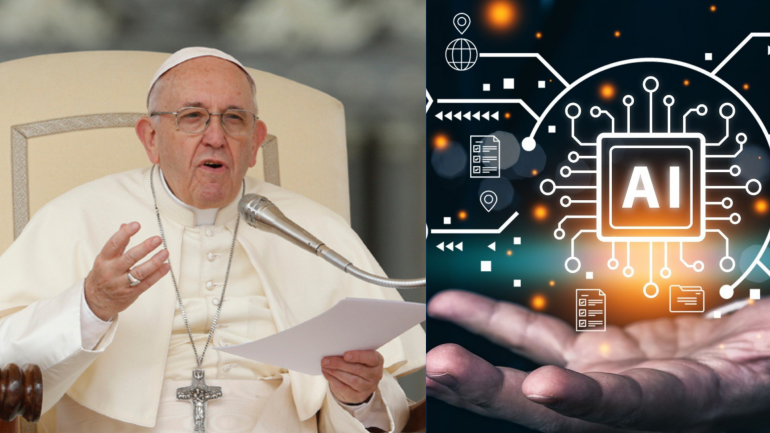Artificial Intelligence can never replace wisdom of human heart, says Pope Francis

Artificial Intelligence (AI) can never replace the wisdom of the human heart, says Pope Francis in his message for the 58th World Day of Social Communications this year, issued on January 24.
Themed “Artificial Intelligence and the Wisdom of the Heart: Towards a Fully Human Communication," it will be commemorated on May 12.
“At this time in history, which risks becoming rich in technology and poor in humanity, our reflections must begin with the human heart. Only by adopting a spiritual way of viewing reality and by recovering the wisdom of the heart can we confront and interpret the newness of our time and rediscover the path to fully human communication,” said the Holy Father.
He cited the Bible, where “the heart is seen as the place of freedom and decision-making. It symbolizes integrity and unity, but it also engages our emotions, desires, and dreams; it is, above all, the inward place of our encounter with God. Wisdom of the heart, then, is the virtue that enables us to integrate the whole and its parts, our decisions and their consequences, our nobility and our vulnerability, our past and our future, our individuality and our membership within a larger community,” said Pope Francis.
He emphasized that such wisdom “cannot be sought from machines. Although the term ‘artificial intelligence’ has now supplanted the more correct term, ‘machine learning’, used in scientific literature, the very use of the word ‘intelligence’ can prove misleading. No doubt, machines possess a limitlessly greater capacity than human beings for storing and correlating data, but humans alone are capable of making sense of that data.”
We need to think of the long-standing problem of disinformation in the form of fake news, which today can employ "deepfakes," namely the creation and diffusion of images that appear perfectly plausible but false (I too have been an object of this) or of audio messages that use a person’s voice to say things that that person never said. The technology of simulation behind these programs can be useful in certain specific fields, but it becomes perverse when it distorts our relationships with others and with reality.
Pope Francis again appealed to the international community “to work together to adopt a binding international treaty that regulates the development and use of artificial intelligence in its many forms.”
He called on everyone “to grow together, in humanity and as humanity. We are challenged to make a qualitative leap to become a complex, multiethnic, pluralistic, multireligious and multicultural society. We are called to reflect carefully on the theoretical development and the practical use of these new instruments of communication and knowledge.”
The Holy Father warned: “The digital revolution can bring us greater freedom, but not if it imprisons us in models that nowadays are called ‘echo chambers’. In such cases, rather than increasing pluralism of information, we risk finding ourselves adrift in a mire of confusion, prey to the interests of the market or of the powers that be.”
He cited the reporting of wars and the “parallel war” being waged through campaigns of disinformation. “I think too of all those reporters who have been injured or killed in the line of duty to enable us to see what they had seen. For only by such direct contact with the suffering of children, women and men, can we come to appreciate the absurdity of wars.”
Pope Francis recognized that “the use of artificial intelligence can make a positive contribution to the communications sector, as long as it does not eliminate the role of journalism on the ground but serves to support it. He added, It's valuing the professionalism of communication, making every communicator more aware of his or her responsibilities, and enabling all people to be, as they should, discerning participants in the work of communication.” (MTV)
He challenged people with several questions; the answers to these, the Holy Father said, are not predetermined but depend on people.
“How do we safeguard professionalism and the dignity of workers in the fields of information and communication, together with that of users throughout the world? How do we ensure the interoperability of platforms? How do we enable businesses that develop digital platforms to accept their responsibilities about content and advertising in the same way as editors of traditional communications media?”
“How do we make more transparent the criteria guiding the operation of algorithms for indexing and de-indexing and for search engines capable of celebrating or canceling persons, opinions, histories and cultures? How do we guarantee the transparency of information processing? How do we identify the paternity of writings and the traceability of sources concealed behind the shield of anonymity?”
“How do we make it clear whether an image or video is portraying an event or simulating it? How do we prevent sources from being reduced to one alone, thus fostering a single approach developed based on an algorithm? Instead, how do we promote an environment suitable for preserving pluralism and portraying the complexity of reality? How can we make sustainable technology so powerful, costly and energy-consuming? And how can we make it accessible to developing countries?”
Radio Veritas Asia (RVA), a media platform of the Catholic Church, aims to share Christ. RVA started in 1969 as a continental Catholic radio station to serve Asian countries in their respective local language, thus earning the tag “the Voice of Asian Christianity.” Responding to the emerging context, RVA embraced media platforms to connect with the global Asian audience via its 21 language websites and various social media platforms.













